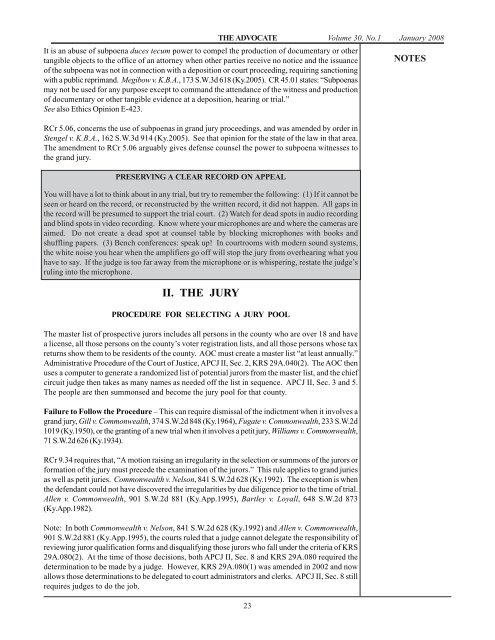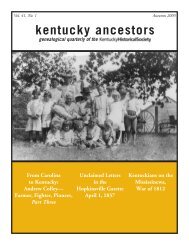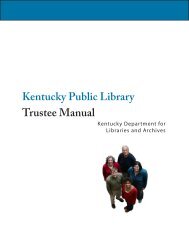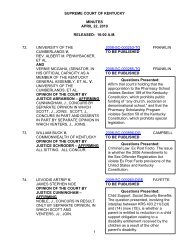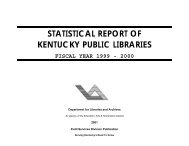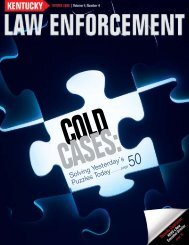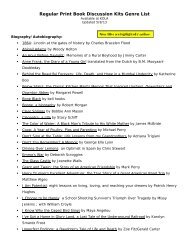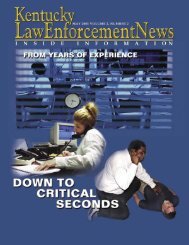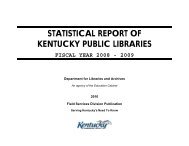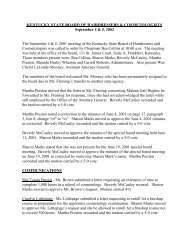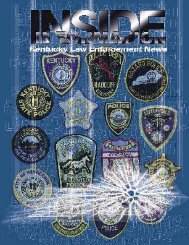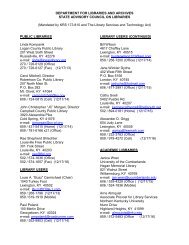Jan08 Advo.pmd - e-archives Home
Jan08 Advo.pmd - e-archives Home
Jan08 Advo.pmd - e-archives Home
Create successful ePaper yourself
Turn your PDF publications into a flip-book with our unique Google optimized e-Paper software.
THE ADVOCATE Volume 30, No.1 January 2008<br />
It is an abuse of subpoena duces tecum power to compel the production of documentary or other<br />
tangible objects to the office of an attorney when other parties receive no notice and the issuance<br />
of the subpoena was not in connection with a deposition or court proceeding, requiring sanctioning<br />
with a public reprimand. Megibow v. K.B.A., 173 S.W.3d 618 (Ky.2005). CR 45.01 states: “Subpoenas<br />
may not be used for any purpose except to command the attendance of the witness and production<br />
of documentary or other tangible evidence at a deposition, hearing or trial.”<br />
See also Ethics Opinion E-423.<br />
RCr 5.06, concerns the use of subpoenas in grand jury proceedings, and was amended by order in<br />
Stengel v. K.B.A., 162 S.W.3d 914 (Ky.2005). See that opinion for the state of the law in that area.<br />
The amendment to RCr 5.06 arguably gives defense counsel the power to subpoena witnesses to<br />
the grand jury.<br />
PRESERVING A CLEAR RECORD ON APPEAL<br />
You will have a lot to think about in any trial, but try to remember the following: (1) If it cannot be<br />
seen or heard on the record, or reconstructed by the written record, it did not happen. All gaps in<br />
the record will be presumed to support the trial court. (2) Watch for dead spots in audio recording<br />
and blind spots in video recording. Know where your microphones are and where the cameras are<br />
aimed. Do not create a dead spot at counsel table by blocking microphones with books and<br />
shuffling papers. (3) Bench conferences: speak up! In courtrooms with modern sound systems,<br />
the white noise you hear when the amplifiers go off will stop the jury from overhearing what you<br />
have to say. If the judge is too far away from the microphone or is whispering, restate the judge’s<br />
ruling into the microphone.<br />
II. THE JURY<br />
PROCEDURE FOR SELECTING A JURY POOL<br />
The master list of prospective jurors includes all persons in the county who are over 18 and have<br />
a license, all those persons on the county’s voter registration lists, and all those persons whose tax<br />
returns show them to be residents of the county. AOC must create a master list “at least annually.”<br />
Administrative Procedure of the Court of Justice, APCJ II, Sec. 2, KRS 29A.040(2). The AOC then<br />
uses a computer to generate a randomized list of potential jurors from the master list, and the chief<br />
circuit judge then takes as many names as needed off the list in sequence. APCJ II, Sec. 3 and 5.<br />
The people are then summonsed and become the jury pool for that county.<br />
Failure to Follow the Procedure – This can require dismissal of the indictment when it involves a<br />
grand jury, Gill v. Commonwealth, 374 S.W.2d 848 (Ky.1964), Fugate v. Commonwealth, 233 S.W.2d<br />
1019 (Ky.1950), or the granting of a new trial when it involves a petit jury, Williams v. Commonwealth,<br />
71 S.W.2d 626 (Ky.1934).<br />
RCr 9.34 requires that, “A motion raising an irregularity in the selection or summons of the jurors or<br />
formation of the jury must precede the examination of the jurors.” This rule applies to grand juries<br />
as well as petit juries. Commonwealth v. Nelson, 841 S.W.2d 628 (Ky.1992). The exception is when<br />
the defendant could not have discovered the irregularities by due diligence prior to the time of trial.<br />
Allen v. Commonwealth, 901 S.W.2d 881 (Ky.App.1995), Bartley v. Loyall, 648 S.W.2d 873<br />
(Ky.App.1982).<br />
Note: In both Commonwealth v. Nelson, 841 S.W.2d 628 (Ky.1992) and Allen v. Commonwealth,<br />
901 S.W.2d 881 (Ky.App.1995), the courts ruled that a judge cannot delegate the responsibility of<br />
reviewing juror qualification forms and disqualifying those jurors who fall under the criteria of KRS<br />
29A.080(2). At the time of those decisions, both APCJ II, Sec. 8 and KRS 29A.080 required the<br />
determination to be made by a judge. However, KRS 29A.080(1) was amended in 2002 and now<br />
allows those determinations to be delegated to court administrators and clerks. APCJ II, Sec. 8 still<br />
requires judges to do the job.<br />
23<br />
NOTES


